The cool of detachment and the fire of transformation
by Aaron Cass
Article published in Der Pfad der Kichererbse by Robert Cathomas and Helga Jacobsen, Chalice Verlag Germany
The Beshara School kitchen at Chisholme House is unique among institutional kitchens. It may be because fresh bread is baked everyday, or because the lamb comes from the field you can see from the dining room, or because for much of the short growing season, its walled garden produces a good deal of the vegetables it uses – in spite of being only fifty feet from the altitudinal limit for horticulture. 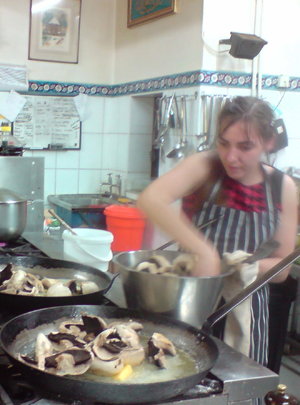 ...or perhaps because even when in the heat of producing a buffet for 200 people there is, more often than not, an alerting sense of calm in the place that belies the scale and scope of what is actually going on.
...or perhaps because even when in the heat of producing a buffet for 200 people there is, more often than not, an alerting sense of calm in the place that belies the scale and scope of what is actually going on.
...or perhaps it is because from its creation in 1973, when it was little more than a single hob, with no need for refrigeration that first winter, feeding the few pioneering souls occupying the dilapidated but promising Chisholme House, itself like its new rough hewn but willing occupants, ripe for restoration – from those early days, when to get to the kitchen you had to walk the plank over a hole down to the basement, right up to today, with its state of the art extractor, stainless surfaces, colour coded chopping boards, its perpetual background refrigerator burble, 24 burners and the four ovens that can produce in total almost apocalyptic quantities of heat, – it has never wittingly bought into the economy of lack that besieges most catering facilities.
For the very notion of catering with its underlying anxiety over control or the loss of it, founded on a belief that we live in a cold, un-convivial universe where the scarcity of means drives us and its other occupants to self-seeking and fear of the dark or of whatever is beyond our unhappy grasp. Such trepidation, while common in this cynical age, is a completely inappropriate frame of mind let alone philosophy upon which to base a food culture, especially one with an expressly spiritual dimension.
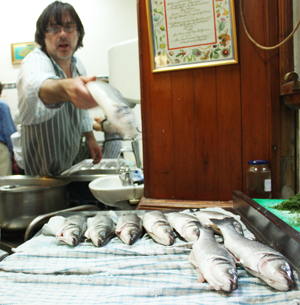 Better for us is to shut our umbrellas and stand in the rain. Elijah was fed by the ravens and Jesus made a few ingredients go a very long way. Neither of these acts of exemplary submission, one emphasising dependency the other providential ability, are miraculous, in that they defy a natural order. On the contrary they affirm the beneficence of nature, and invite us to see what is in front of us in a new way.
Better for us is to shut our umbrellas and stand in the rain. Elijah was fed by the ravens and Jesus made a few ingredients go a very long way. Neither of these acts of exemplary submission, one emphasising dependency the other providential ability, are miraculous, in that they defy a natural order. On the contrary they affirm the beneficence of nature, and invite us to see what is in front of us in a new way.
Such a vision, born of the acknowledgement of the unity of being, is at the heart of the Beshara School, and its kitchen is under the order of generosity where this vision, appropriately perhaps, is more a matter of taste than a philosophy – an ethos rooted in sensory and subtle experience rather than an ideology. And the deliberate affirmation that the universe is a generous place, not always easy in the constrictive chill of a Scottish winter, doesn’t mean that the Beshara School kitchen doesn’t have budgets and scales and weights and measures, only that these orders become, when rightly aligned, servants to that greater spirit whose expression is their very reason for being. In this atmosphere the 50g weight becomes a devotee of its beloved yeast, and the recipe for crème caramel, a kind of billet doux.
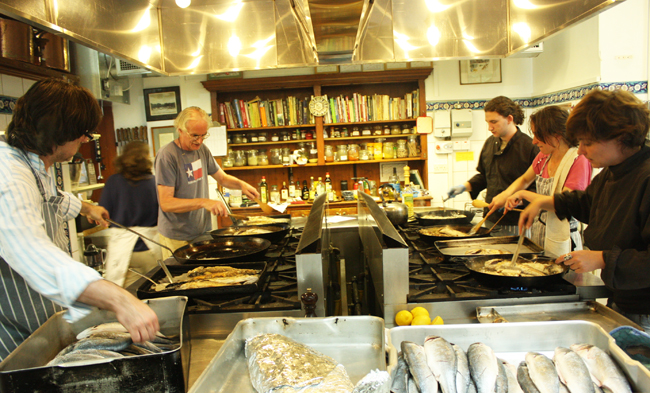
The Beshara School Kitchen may also be special because its founder, Bulent Rauf, a Turkish émigré and man of unequivocal nobility – whose largeness of presence belied an even more capacious heart, and who showed, by his very being, that all is in fact tardic. That from carrots to cooking to consciousness itself, all is bigger on the inside and finds its true horizonless compass when gathered in the believing heart, or the appropriate pot.
Bulent, who asked permission from God to drink a glass of water, made it perfectly clear that cooking is a discipline more profound and far reaching than most. Cooking enacts with tangible intensity a special confluence of chemistry and soul, requiring both undivided focus (given the proximity to lethal blades and fire) and the broadest artistry. It demands all at once rigorous time keeping, flexibility, watchfulness, patience, and attention to detail. Its muse will abandon the cook who does not show consideration for all the ingredients used or fails to maintain an uncluttered, time-aware mindfulness of the ultimate aim. It’s an art and a science with a uniquely visceral and ancient spirituality at its core, and whose most crucial ingredient is, in the end, gratitude to nature, reality, God.
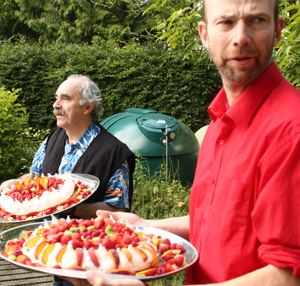 In the spirit of this last Bulent set up the Beshara School kitchen to show the willing aspirant to self knowledge and service a practical path to awareness, a kind of three dimensional multi-sensual guide to the etiquette of love, where love is love of union, or sheer beauty, unqualified by this or that yet traceable by taste in every dish and dessert, like Nizam’s footprints in the desert of Muhyiddin Ibn Arabi’s Mohammedian heart.*
In the spirit of this last Bulent set up the Beshara School kitchen to show the willing aspirant to self knowledge and service a practical path to awareness, a kind of three dimensional multi-sensual guide to the etiquette of love, where love is love of union, or sheer beauty, unqualified by this or that yet traceable by taste in every dish and dessert, like Nizam’s footprints in the desert of Muhyiddin Ibn Arabi’s Mohammedian heart.*
On this path, where one loves to learn and learns to love, the real uniqueness of the Beshara School kitchen is revealed. This is a place where the cooks themselves are cooked – where we undergo a transformation by fire and pressure and time, as carbon is diamondised by the same three tutors, not to become anything different from our original darkness but simply now, manifestly amenable to light, aspiring even, to invisibility.
There is a Koranic saying “Paradise is surrounded by the things that you dislike”. In Paradise Lost Milton’s Eden was, like the head of the Christ poised at the threshold of his transubstantiation at the doorway between the worlds, ringed with thorns. To taste the fruits of love, trials are to be undergone, tasks under-taken, education engaged in, the inedible made edible. Cooking, like mindfulness is a path of return, which paradoxically comprises endless creativity and refreshment.
Mindfulness practice, as distinct from the apotheotic condition embodied by Jesus, like any approach to the integration of being and knowing is comprised both of a stillness of heart and an energy of engagement because its aim is, I believe, to witness the unity of being, in the unity of being. It is both return and adventure. Like the revolutions of the dervish it employs complementary and opposing forces, centrifugal and centripetal, to holistic effect. An intuitive grasp of this dynamic order is essential. If cooking is conceivable as a spiritual practice then it is because it demands conscious, centred immersion in matter and energy, rather than blissful detachment or its unintended but inevitable corollary of getting lost in the confusion of the manifest.
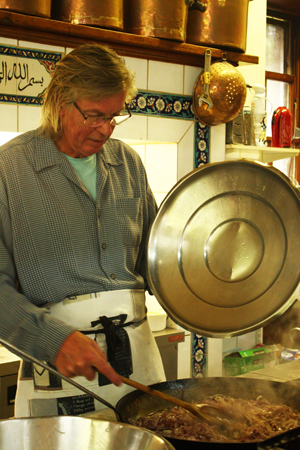 Indifference or intellectual pre-occupation have no more place here than anything-goes cuisine. We are, after all, in a busy working kitchen, making food for between 20 and 40 people on a regular basis and up to 10 times that on special occasions; like the ingredients we are plunged, blanched, steeped, boiled, braised, burnt, fried, frozen, roasted and eaten. Our contemplation then is right in the thrall and throng of the manifest. The very tangibility of food and the processes by which it is made flavourful, is a challenge to any spiritual perspective that emphasises transcendence over immanence, principles over practice, our spiritual life over the vehicular wonder that is the body. It is also a direct challenge to our conscious and unconscious ideas of self as a reality separate from everything else. Its moments of urgency wrench you from yourself, its potential for out and out chaos, forces you to take refuge in the eye of its creative storm.
Indifference or intellectual pre-occupation have no more place here than anything-goes cuisine. We are, after all, in a busy working kitchen, making food for between 20 and 40 people on a regular basis and up to 10 times that on special occasions; like the ingredients we are plunged, blanched, steeped, boiled, braised, burnt, fried, frozen, roasted and eaten. Our contemplation then is right in the thrall and throng of the manifest. The very tangibility of food and the processes by which it is made flavourful, is a challenge to any spiritual perspective that emphasises transcendence over immanence, principles over practice, our spiritual life over the vehicular wonder that is the body. It is also a direct challenge to our conscious and unconscious ideas of self as a reality separate from everything else. Its moments of urgency wrench you from yourself, its potential for out and out chaos, forces you to take refuge in the eye of its creative storm.
The exemplar of this resourceful centeredness, Mevlana Jelaluddin Rumi’s celebrated cook Shamsuddin Ateshbaz Wali, put his foot in the fire because he had run out of fuel for the meal. This was not a punishment for forgetfulness or being ill prepared, it was a sign of his commitment to the transformational process, that cooking not only represents but actually is. His own self, or that of himself that obscured the universal reality of his Self, what Ibn Arabi might call the “uncreated ” reality of the person, he knew and trusted enough, to be fuel, usefully expendable, meant for a purpose beyond itself, its place in the order of things being the twin glories of dependency and ash.
And Rumi his Master and the one for whose taste he was prepared to go limbless, also advises the seeker to stand in the fire and be still. Again not to prove the superiority of mind over matter, nor to dispute the laws of physics, nor to demonstrate triumphant self-sacrifice, or to celebrate a condition of freedom from pain – but better than all these capacities and powers, to advise that we stand with passion in the very centre of our being – awake and sensible to that unpredictable wish that is the beloved’s own desire. Standing in the fire is being in the moment, unequivocally present whatever the conditions. This is Ibn Arabi’s ‘garden amidst the flames’, a ‘marvel’ because it is the cool, green, fertile perspective from which the unconsumed conflagration of the diversity is witnessed as one and many at once **Rumi’s call to stand in it and not to move, is a call to practice a kind of ultimate mindfulness spoken in the language of love.
In this kitchen we are not cooking for money or to fill stomachs, nor are we cooking for self-expression or to demonstrate skill; we are cooking because we want to be made suitable for our beloved, because we want to be Shamsuddin’s foot, and directly experience the transformational energy of real presence – the presence of love. We want to be alive with Life itself and stand in its transubstantiating fire.
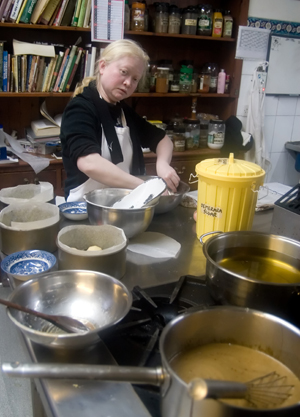 With this aspiration firmly in mind then, we must go back to the practical heart of the matter – the process itself. For here cooking is not an after effect of a philosophy or belief – it is experiential learning at its most rigorous and liberational. It is the thing itself. Rumi, the educator par excellence, famously describes the cooking of chickpeas as a metaphor for the education of the person who wants to know themselves as they really are. The chickpea tries to jump out of the pot but the cook pushes it back into the tumultuous boil. Perhaps it thinks it is already fine as it is, or is afraid or even imagines it is a strawberry and doesn’t belong in this dish. Whatever the reason for its attempt to escape its destiny its return to the heat is assured – a direct demonstration of the remedial aspect of unification, and the individual ingredient finding its place in the total, a place heralded, whether they have acknowledged it or not, by their own inherent nature.
With this aspiration firmly in mind then, we must go back to the practical heart of the matter – the process itself. For here cooking is not an after effect of a philosophy or belief – it is experiential learning at its most rigorous and liberational. It is the thing itself. Rumi, the educator par excellence, famously describes the cooking of chickpeas as a metaphor for the education of the person who wants to know themselves as they really are. The chickpea tries to jump out of the pot but the cook pushes it back into the tumultuous boil. Perhaps it thinks it is already fine as it is, or is afraid or even imagines it is a strawberry and doesn’t belong in this dish. Whatever the reason for its attempt to escape its destiny its return to the heat is assured – a direct demonstration of the remedial aspect of unification, and the individual ingredient finding its place in the total, a place heralded, whether they have acknowledged it or not, by their own inherent nature.
Being made edible is being in alignment with an order, holistic and flavoursome. It is for the chickpea the softening of the barrier of its desiccation by hot water in the fulfilment that is humus, its complete absorption into the community puree. No loss of identity is implied in this integration of part and whole since humus is made of chickpeas and not strawberries. On the contrary, a new more potent mode of itself, distilled by participation in the collectivity, elevated by the company of its fellows, brought into focus by lemon juice, the John the Baptist of ingredients – awakening the palate with the announcement of a greater flavour on its way – and unified by salt, that perfect servant who brings out the taste of every ingredient except themselves, is brought into being with a new and more evolved flavour unachievable in raw isolation.
So even in this almost industrial space, with all its steel and stainlessness, blades and bowls, fire and ice - there is an intimacy and a sense of grandeur, born of the intention to know oneself in the thick of life. The grace of this vision may descend at any time upon anyone who puts themselves under its unfettered compass.
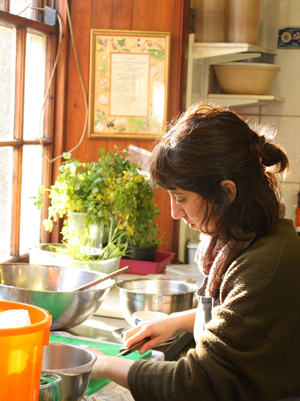 Large, elegant Victorian sashes, welcome the north-western light, from its pale winter greys to the African orange-gold of a summer sunset, so that at times a person cutting parsley or juicing lemons by one of its windows could be the subject in a contemporary Vermeer, their movements now in this borderless present, modulations of stillness, so nothing at all is happening even as the knife still cuts and the juice still runs. I have seen this very thing and felt it for myself, and it is not just the setting, nor the contemplative intention of the Beshara School – but the presence of the human both as transformer and transformed poised and awake somewhere close to the vertiginous centre of their being, where action and inaction, capacity and incapacity meet.
Large, elegant Victorian sashes, welcome the north-western light, from its pale winter greys to the African orange-gold of a summer sunset, so that at times a person cutting parsley or juicing lemons by one of its windows could be the subject in a contemporary Vermeer, their movements now in this borderless present, modulations of stillness, so nothing at all is happening even as the knife still cuts and the juice still runs. I have seen this very thing and felt it for myself, and it is not just the setting, nor the contemplative intention of the Beshara School – but the presence of the human both as transformer and transformed poised and awake somewhere close to the vertiginous centre of their being, where action and inaction, capacity and incapacity meet.
Where else is there to be?
Aaron Cass; Chisholme House, Scottish Borders, 17th June 2013
This article was commissioned by Chalice Verlag for their anthology: Der Pfad der Kichererbse by Robert Cathomas and Helga Jacobsen
Notes:
- See Tarjuman al Ashwaq – The Interpreter of Ardent Desires, Ibn Arabi’s collection of poems on the theme of Love, where the beloved is the Divine Wisdom, tracked through the desert of experience, like a camel train headed by a woman of devastating regal beauty.
- ** Again see Tarjuman al Ashwaq



 Please enter your email below to be kept informed of news and events, or to send comments or questions.
We will keep all your personal information confidential and not share it with anyone, or any other
organisation.
Please enter your email below to be kept informed of news and events, or to send comments or questions.
We will keep all your personal information confidential and not share it with anyone, or any other
organisation.